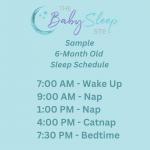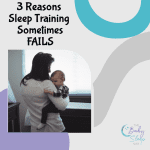
When you are sleep training a 6-month old, there are a few specific things to consider before you start. This article discusses 5 things you should know before you begin sleep training your 6-month old.
1. 6-Month Old Schedules
One of the most important things you should do before you start sleep training is to make sure your baby’s schedule is age-appropriate and a good fit. If you are putting your baby down for nap or bedtime at the wrong time, this can make sleep training even more difficult, resulting in much more crying throughout the process.
Some people believe there is a 6-month sleep regression, however, it’s more likely that your 6-month old baby is transitioning to 2 or 3 naps. (Down from 4 that he or she possibly took as a 4- or 5-month old.)
Once your baby transitions to 3 naps, or possibly 2, make sure the naps are evenly spaced throughout the day, so your baby isn’t as over-tired by bedtime. This will cut down on the amount of crying since overtired babies tend to cry more due to the fatigue and irritability they are feeling.
Your baby will stay on a 3-nap schedule until about 8-9 months old. However, if your baby takes long enough naps, he or she may already be on a 2-nap schedule, which would be “fine” as well. All babies are unique, including their sleep development. Not all babies can stay awake 3-4 hours just yet, which is often required on a 2-nap schedule.
Looking for help with your baby’s schedule? Check out our 6-month old schedule here.
2. Starting Solids
Another common milestone many babies and parents reach around 6 months old is starting your baby on solid foods.
I know many parents secretly hope that starting solids will help their baby sleep but we haven’t found that to be the case unless the only sleep problem you have is that your baby is hungry. Most of the time, your sleep problems have little to do with genuine hunger. Much more often, you’re dealing with some other issue causing your baby to wake at night and/or take short naps.
In some cases, starting solids actually makes sleep worse, especially if one of your first foods is rice cereal which has been known to cause constipation. Many babies wake more at night either due to discomfort or sometimes simply ill-timed bowel movements that tend to come at the “wrong” times at the beginning. Don’t worry, your baby’s body will adjust, eventually!
Keep in mind it’s not a good idea to overdo the solid foods. Breast milk and/or formula should be your baby’s primary nutrition for the first year.
Looking for help with feeding? Check out our baby feeding chart.
3. Need to Stop Swaddling
While you are sleep training your 6-month old, keep in mind that you want his or her hands free for self-soothing. The goal of sleep training is that your baby can get through their sleep cycles without your help. Keep in mind they are babies, so it doesn’t mean they will never need you, but simply, they shouldn’t need you multiple times a night every single night. And, we want to encourage naps that are at least an hour in length twice a day at this age.
So, in order to be more successful in sleep training, if your baby has his or her hands bound, you will want to stop swaddling as part of the sleep coaching process. This way, your baby can find their hands, thumb, or fingers to help get through sleep cycles. Since many 6-month-olds are already rolling, it’s safer to stop swaddling anyway.
When you stop swaddling, many parents want to know when babies can sleep with a blanket, but loose blankets aren’t recommended until your baby is at least a year old. Even then, not many young toddlers will leave a blanket on for warmth. So, plan to transition to a wearable blanket or sleep sack.
4. Night Feedings
Many people wonder if they should stop feeding the baby at night when they start sleep training. Keep in mind that you don’t necessarily have to stop feeding your baby at night just because you start sleep training. We have helped many families achieve much-improved sleep while keeping night feedings. Of course, in some cases, babies make the most improvement once they stop feeding at night, but not all need to take that extra step.
Some babies especially breastfed babies, still need night feedings, so you will make sleep training much harder if you drop feedings at the same time. At 6 months old, most formula-fed babies can be night-weaned, but breastfed babies tend to need at least one feeding at night still. Also, sleep training will be much harder if you’ve been feeding your baby 3-4 times a night and try to reduce down to just one night feeding abruptly. There are a multitude of ways to do sleep training so you can limit how much crying there is during the process. So, try not to think of night feedings as all or nothing. It’s also okay to break your goals into pieces.
Not sure if your baby is ready for night-weaning? Take our night-weaning quiz or consider sleep training services!
5. Can you let 6-month-olds cry it out? Do you have to let 6-month-olds cry it out?
Many parents wonder how exactly to do sleep training, which is, of course, one of our specialties! There are so many ways to achieve one goal. When you are changing habits, you can go about things in a variety of ways such as cold turkey, gradually, or replace a habit with something else, for example. If you want to eat less sugar, is it easier for you to cut it out completely, limit it, or replace it with something else like a sugar substitute or honey? Well, if you’re reading this you may answer one way and another person might answer differently. Sleep training is no different.
There is no one-size-fits-all approach to sleep training your 6-month-old. Your baby is unique and so are you. The #1 thing that makes a strategy successful is your ability to commit to it. Follow through with your plan consistently and for enough days in a row to make a new habit.
So, no, you don’t have to let your 6-month-old cry it out to see success if you prefer a gentle sleep training technique. You can try a gentler sleep coaching approach and you can always re-evaluate if you have trouble making progress. Sometimes small tweaks to a particular approach can make a huge difference, too.
Now, if your baby is more persistent and spirited or you simply need a faster approach (maybe you’re a surgeon and going back to work in 2 weeks), you can let your 6-month-old cry it out if that’s the path you’ve chosen. This is a good age to do so before your baby is standing or going through the 8-month sleep regression. However, keep in mind that it’s important to make sure everything else in their day sets them up for success. This will cut down on the amount of crying in a significant way, in some cases. There’s nothing worse feeling than letting your baby cry and there was something else wrong besides a bad habit.









